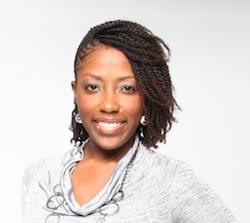
As we all know, February is Black History Month. It’s a month where we honor those who have made an impact on American culture for equal rights, those who have invented, those who have a helped others and those who have inspired everyone to be the best they can be, not only as a person of color but as a human. Last year for Black History Month, I started an online series called 28 Days Diversity where I would feature someone new everyday during the month of February for just being awesome in their own right. Even though it’s black history month, the goal for 28 Days of Diversity is to feature not just African-Americans but other minorities in the web/tech space. Also note that 28 Days of Diversity is not a popularity contest or an influencer list but a list of thought leaders in the social web sector, including entrepreneurs, bloggers, conference organizers, IT professionals and friends not ranked in any particular order who I have either met in person or followed online. Each post will include a picture, bio, two links from the selected person and this paragraph.
For 2011 I wanted to not just feature individuals but also address a topic that affects everyone. For 28 Days of Diversity 2011 each post/person will answer the question “How can we use technology to close the digital divide?” So for the next 28 days, come back to visit SocialWayne.com/tag/28daysofdiversity and 28daysofdiversity.com to see who’s on the list. For day 28, I would like to introduce to some and present to others:
Marcia Wade Talbert
Twitter: @newsgyrl
Website/Blog: www.BlackEnterprise.com
Bio
Marcia is a multimedia content producer focusing on technology at Black Enterprise
Magazine. Before joining BlackEnterprise.com as an interactive reporter in 2008, she
freelanced with Black Enterprise for several years while working as the technical editor
at Prepared Foods magazine. There she further honed her writing skills and became
an authority on food ingredients, including ingredients used in food fortification and
enrichment. Her freelancing helped keep her stay current on issues pertaining to the
financial and business welfare of African Americans.
Marcia has a Bachelor of Science degree in agriculture with an emphasis in food science
from the University of Minnesota, and a Master of Science degree in journalism from
Roosevelt University in Chicago. En route to her secondary degree, she served as the
editor-in-chief of the Roosevelt University Torch, a weekly, student-run newspaper.
An avid photographer, Marcia is one of several employees at BLACK ENTERPRISE
who interned for the publishing company as a college student.
How can we use technology to close the digital divide?
In many ways technology is both the great equalizer and the great divider because with
technology (WiFi, broadband, and a laptop or computer) low income individuals and
racial minorities are not limited by the boundaries of their habitations.
With these tools access to government forms, news, and services is easier; listings for job
openings are more equitably distributed; and it helps (to a small extent) to even out the
playing field for small disadvantaged businesses competing against huge multinational
corporations.
At the same time, even if the National Broadband Plan is successful in connecting
America through high speed internet that alone will not solve the racial inequities of
career advancement in the technology sector, which in my opinion is the real digital
divide. African Americans, Hispanics, and women are disproportionately represented in
the roles of scientist, engineer, developer, patent holder, and chief executive at our most
prominent technology and social media companies. If you don’t believe me, take a look
at this picture.
The solution doesn’t involve technology as much as it involves policy. Yes, of course,
we need more computers, better science labs, and more tech-savvy teachers in urban
schools, but I do not doubt that the number of capable, high achieving, unemployed
African Americans with computer science, engineering, or physics degrees is higher than
it should be. There are too many minorities and women with world-changing ideas and
inventions who can’t get the capital or the connections for startup funding, let alone a job.
In order to close the digital divide we need to crack down on banks who aren’t loaning
to small minority businesses. We have to stop taking the nonchalant attitude that the
banking system can do whatever they want to us and our communities. We need to keep
tabs on our local banks and make sure that some of the $30 billion in the Small Business
Lending Fund is going to innovative, small and disadvantaged businesses. We also need
to wage a campaign to stop the SEC from discrediting micro-lending institutions as that
door has recently been open to help launch many women and minority-owned businesses
globally.
In addition, we need to hold companies like Facebook and Apple accountable by not
only requiring that they have chief diversity officers, supplier diversity programs, and
that they disclose the demographic makeup of their entire workforce, but that they also
achieve racial parity within their technology divisions. And when they give us the excuse
that there aren’t enough talented black and Hispanic scientists or engineers we need to
first reject that notion, and then point them towards our HBCU’s or towards programs at
predominantly white institutions like the University of Maryland Baltimore’s Meyerhoff
Graduate Fellows program. Finally, we should follow-up with our disdain for their lack
of diversity by closing our pocketbooks to their products until they make the changes we
demand.
Furthermore, the money we don’t spend with them should be invested in minority tech
companies or at the very least with companies that respect diversity and inclusion in their
laboratories.
You can follow the status of 28 Days of Diversity 2011 on http://28daysofdiversity.com, https://socialwayne.com/category/28-days-of-diversity/ and syndicated on BlackWeb 2.0.
